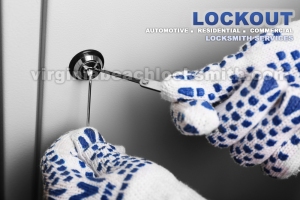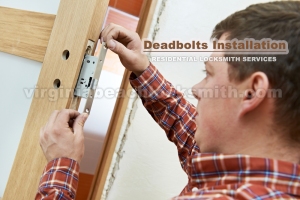Lockouts happen; it can be best to deal with them before they happen. Among the most widely accepted pre-emptive measures is to leave a copy of the house’s key with a neighbor. It requires the upkeep of good relations between the neighbors in question; the responsibility demands a lot of trust between the lender and keeper of the key. Some, of course would rather entrust them to friends and family about town. The only advantage to depending on the neighbors is that they are right next door.
 If one does not have other people they can trust, then hide-a-key is widely sold at home improvement stores. They are designed to blend in with the immediate environment, more often décor, outside the front door. Certain models have combination lock features, while others are freely accessed. Their recent popularity has prompted thieves to adapt by adding the “hide-a-key hunt” to their repertoire. Residents of Virginia Beach, VA are keenly aware of the flow of world-wide visitors that pass through the town during the summer tourist season and adjust their home security measures in turn.
If one does not have other people they can trust, then hide-a-key is widely sold at home improvement stores. They are designed to blend in with the immediate environment, more often décor, outside the front door. Certain models have combination lock features, while others are freely accessed. Their recent popularity has prompted thieves to adapt by adding the “hide-a-key hunt” to their repertoire. Residents of Virginia Beach, VA are keenly aware of the flow of world-wide visitors that pass through the town during the summer tourist season and adjust their home security measures in turn.
The following approach is a bit more drastic. It is possible to open windows with simple latches by wedging a thin flathead screwdriver into the space between the wall and window to manipulate the lock on the opposite side. Another popular method for window breaching is manual destruction. If no hard objects are available then one can wrap their hand in a thick cloth covering to cushion the impact. Some rational home owners would be too mindful of cost or injury to try this technique.
If there is a toolkit handy then disassembling the lock might be an option. Door handles will sometimes be screwed in from the bottom, just under the knob. Secondary bolt locks though, are always anchored from the inside. That aside, it is worrisomely effortless to kick open a door. Keeping the back straight, lift one foot to waist level and with support leg bent, thrust the heel for the area beside the lock. Again, property destruction is not for everybody. In that case it could be that there are reachable entry points on top of the roof that have not yet been examined. Skylights, air ducts, attics, and chimneys are all plausible yet unpleasantly dangerous ways to enter a home unconventionally. No one wants to do this, or take the risk, which is why a Virginia Beach locksmith or a lock and security provider in your local area should be contacted.
For renters, the answer is simpler. Those renting properties have the option of calling the landlord who undoubtedly has a copy of the key .Prospects for successfully convincing a landlord to come to the rescue really depends on their work load and personal schedule. The degree of good will that renter and proprietor share has bearing on how willing they may be to get involved. Home owners on the other hand, can contact the original real estate company which may or may not keep one on file. Banks that make mortgage loans also keep copies of the original lock set in case of foreclosure.
Lock picking could be a possibility if the door contains common locks with pin cylinders. As a practice, picking locks is shunned by most because of its association with criminal activity. With all other options exhausted, a locked out person has the choice to make- get a professional or try their hand at amateur picking. Virginia Beach Locksmith is always available for those that live in town and need lockout help.
Professional grade lock picking kits are sold wherever commercial locks can be found. The picks in these kits are specially designed to fit into key holes. A reliable go-to substitute would be hairpins that are sturdy, yet flexible enough to bend into a shape and hold its form. The desired form is for it to be perfectly straight except for the end which is bent at about forty-five degrees. Two are needed, one to act as the pushing lever part of the key, and the other to act as the teeth (the jagged portion that push the right pins). The first one that holds the barrel in place should be folded over to strengthen it. Using one to apply pressure on the barrel, insert the other to push the pins. This process must be done entirely by feel. Move the second pick up and down to feel out the pins. When one is encountered that seems stuck, press back and forth at a perpendicular angle to move the pin into place, then move on to the rest in the same manner. If successful, the barrel will turn and unlock the door. Note that this method is meant only for pin tumblers so it may not fit every situation depending on the circumstances.
The method for dealing with car lockouts is similar. Physical re-entry requires a special tool known colloquially as a slim-jim. The car door’s window is wedged open and a thin arm is inserted to move the lock button. They come with hooks that are used to pull lock buttons up as needed. Unfortunately, if the wedge maneuver is done incorrectly, the window will strain and break. At that point, unlocking the door is no longer a concern. Before this happens, consider local professionals like Virginia Beach Locksmith.
Instances of lockouts occur for so many reasons that there’s often no way to see them coming. The key is to step back and consider the options at one’s disposal. Virginia Beach Locksmith is always there and ready to get people past their own locks and on with their lives. Look up the lock and security provider in your local area if you ever become locked out of your property. It is much easier to go this route – you can save yourself from causing property damage.
Aricle source here: Steps to Take During a Lockout

